Photographs: Prasanna D Zore/Rediff.com Prasanna D Zore in New Delhi
Congress general secretary Rahul Gandhi made a sincere effort to define the common man (the ubiquitous aam aadmi) at the Congress plenary session held at Burari on December 19. Here's the definition of the aam aadmi in his own words:
"The aam aadmi is that person who does not have a connection to the system. Whether he is poor or rich, Hindu, Muslim, Sikh or Christian, educated or uneducated, if he is not connected to the system, he is an aam aadmi. The aam Aadmi is the tribal boy in Nayamgiri who is thrown off his land without justice, the Dalit boy in Jhansi who is forced to sit at the back of the class room. She is the young professional from Bangalore who can't get her child into a good school, or he is the university topper in Shillong who cannot get a job because he does not know the right people.The aam Aadmi is the farmer in Aligarh who does not get the price he deserves for his land or is the businessman in Hyderabad who is pushed aside because he does not have the right connections.The aam Aadmi is the widow in Vidarbha who despite tragedies in her family is struggling to make ends meet or is the bureaucrat whose professional future is at risk because he refuses to compromise. He is the worker who builds the Metro with his blood and sweat but will never get the credit for it or is the poor carpenter from Basti living in the slums of Mumbai who did not get an education because of lack of opportunity."
He could have, well, gone on and on but he seemed to have missed some salient features of this "unique" creature called the aam aadmi.
Taking a leaf from Rahul Gandhi's definition rediff.com searched the ground in Burari and inside the main tent, where Congress VIPs spoke for two days and where thousands of Congressmen (or should we say Rahulji's aam aadmi) too had gathered from the nooks and corners of India, in search of the common man. Here's what we found out.
Seven-year-old Suraj, along with 20 odd people dressed in dirty, torn clothes, was chanting 'Congress Zindabad'. Dressed in badly fitting dirty white kurta and pajama he sported a tri-colour scarf with the Congress' election symbol emblazoned on it. He was stylishly holding a tri-colour flag with a charka at the centre of the flag. His companion Raja with Congress President Sonia Gandhi's huge cutout in his hand followed him closely in a neat file.
Suraj's father's a homeless daily wage earner who sleeps on streets of Delhi with his family. He moves from one street to another in search of a cozy warm place and away from the gaze of Delhi police (the system) with which the family's not 'connected'.
Suraj begs on the street while his mother scavenges Delhi's dirt in search of plastic waste. On December 19 Suraj thought he was lucky. "Dutta has promised us Rs 100 for chanting slogans with the flags and cutouts in our hands," says Suraj's friend Raja.
Ask Suraj who is Dutta and where is he and what you get is only silence.
Only of seven, Suraj is scared to speak with this correspondent. Even when he musters enough courage to speak he tries to hoodwink me. He tells me he's come from Jammu. He distrusts somebody who does not look or wear clothes like him. But Raja and Suraj's other friends show keenness in the hope that their pictures will be ...
The love of the Nehru-Gandhi legacy
Image: Dutta raises a sloganAsk Dutta if he is the leader of the pack and he passes a warm smile at you. Ask him if he has promised to pay his party, including Suraj, Rs 100 each for showcasing their love for the party and Dutta's sneers at you.
"I myself don't have even Rs 2 in my pocket right now. How on earth can I pay each one of them Rs 100?" he shouts at you. The next moment he turns his wrath on the party for which he has been working for more than 50 years now.
First he abuses the Congress party with select expletives that are so common in the nation's capital and then abuses an AICC general secretary "who roams around the capital in a monstrous white SUV and whose son, Dutta claims, tried to kill him.
"Look at the scar below my left eye," he brings his face closer to your eyes.
You wonder at this old man's anger and try to reason out if he hates the party so much then why is he working for them.
Prompt comes the answer: "It's for the love of the Nehru-Gandhi legacy. The day they will cease to exist the Congress will collapse," he says again turning his anger against the same Congress general secretary.
Two minutes after Dutta moves on Suraj passes this correspondent. I can see the joy on getting Rs 100 clearly in his eyes as our eyes meet each other for a moment. I think of what Dutta told me about the payment and turn my eyes away from Suraj's.
The episode gives me an additional attribute of the aam aadmi: He will abuse you but yet work for you for the love of your forefathers.
'I wanted to see Soniaji in real life'
Image: Uddhav Abaji RautTalking to him you come to know he is a farmer and has come with a troop of 22 people from Solapur to experience what a plenary session is all about. "I have grown very old now. I wanted to see my beloved leaders--Dr Manmohan Singh, Sonia and Rahul Gandhi--in real life before my death," he explains why he had to put in so much effort to travel almost 36 hours by train in his local Marathi dialect.
Raut says that he has been camping in Burari since December 18 and will return home by train. Another 36-hour journey for this 70-year-old man.
Yet another feature of the aam aadmi that the Congress general secretary and "India's future Prime Minister" Rahul Gandhi so eloquently defined?Mad scramble for the 'seat of power'
Image: Parveen and her friend from Burdwan districtParveen and her friend from Burdwan district of West Bengal are two such spirited women. Parveen exults in the joy of being the first person to occupy "Madam ki seat (Sonia gandhi's seat)". She seems to have attained enlightenment when her friend tells her about her exploits and the uniqueness of the event.
Within minutes the entire dais is filled with Congress workers. Some take over the podium from where all the dignitaries spoke and try to emulate them. They don't let others, who eagerly await their turn, enter the podium until their friend has not even make a short speech as the mobile captures the action which they plan to showoff to their families and friends when they go back to their home towns.
Parveen doesn't want to be left behind. She pleads with this correspondent to click her picture "in front of Madam". Sportingly, she waves her hand before and then giggles uncontrollably for imitating her role model.
Only common women can act silly and yet derive joy out of it.People in power are ignoring the grassroots workers
Image: Harmeet Singh from Ludhiana"I had come here with the intention of meeting one of the Congress general secretaries and expose the corruption that is rampant in Ludhiana. But I think Soniaji was right when she said that senior leaders and ministers in position of power are ignoring grassroots workers. This person asked me to write my complaint and give it to his personal secretary. I know he is not interested. I plan to go back to Ludhiana tomorrow," he said exasperatedly.
But wouldn't his corrupt colleagues now try to intimidate him once he goes back to his home town? "I don't care," Harmeet Singh replies in anger.Is this sycophancy or the love for her party?
Image: Ameena with Ahmad PatelShe heckles other party members and jumps the queue to shout slogans in front of yet another Congress general secretary and Gujarat MP Ahmed Patel.
"Ahmedbhai zindabad, Ahmedbhai zindabad," she leads the chorus. Other supporters in tow have no other option but to follow Ameena.
Without doubt Mr Patel is impressed and talks to her for a few moments and then moves past her.
Impressed by her leader's magnanimity, Ameena continues with her "Ahmedbhai zindabad, Ahmedbhai zindabad."Revenge of the common man
He was threatened to cut their daily wage if they "didn't complete their work" as early as possible. But most of them seemed least affected by his warnings. They carried on working at their own pace.
They knew that was the best way of getting at the thekedaar. Even if he could have cut their wages they knew that the thekedaar would not have been able to leave unless they had completed their work and the former had submitted his report to his superiors who too had to wait much longer after the sun set early on December 20.
Who said the common man cannot seek revenge.

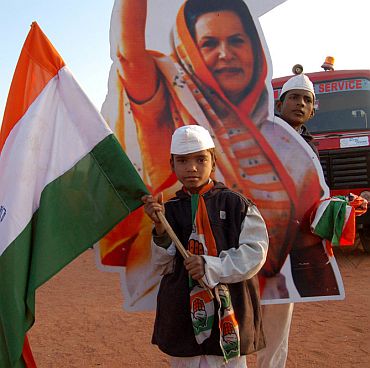
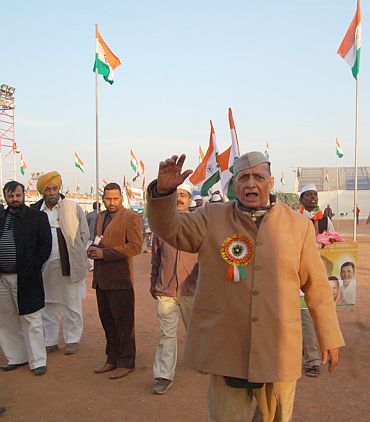
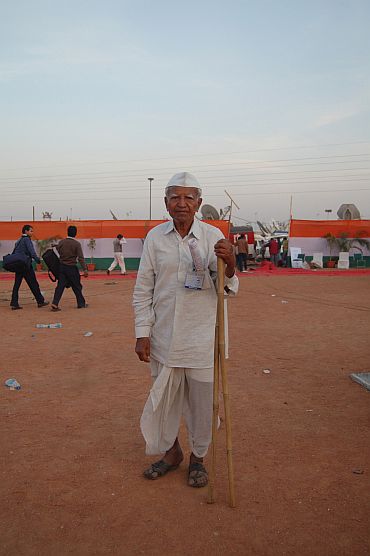
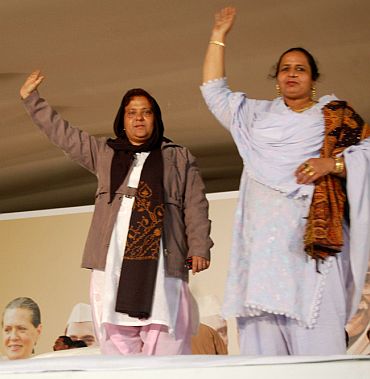
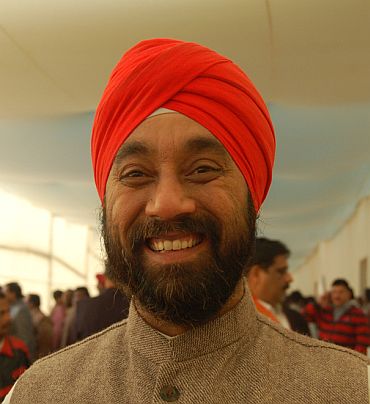
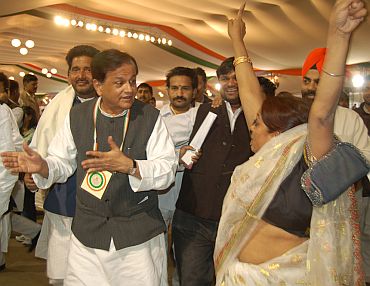

article